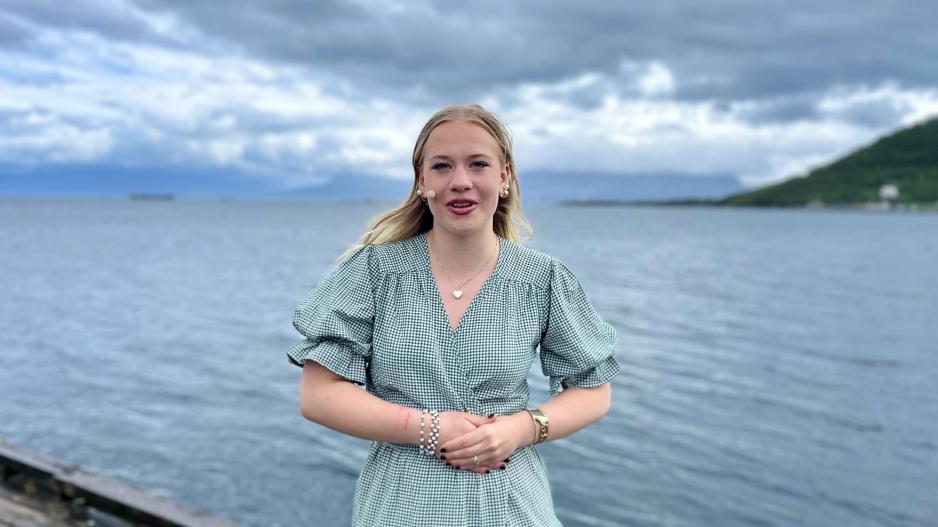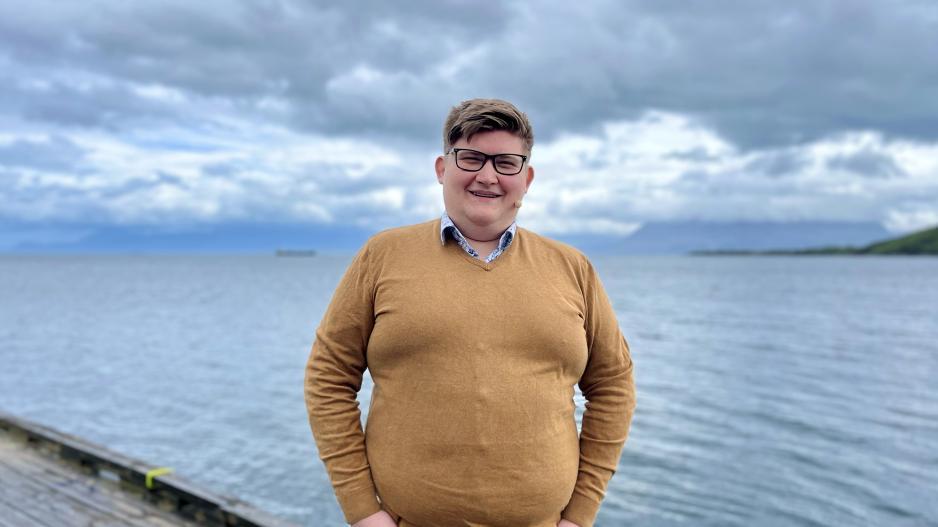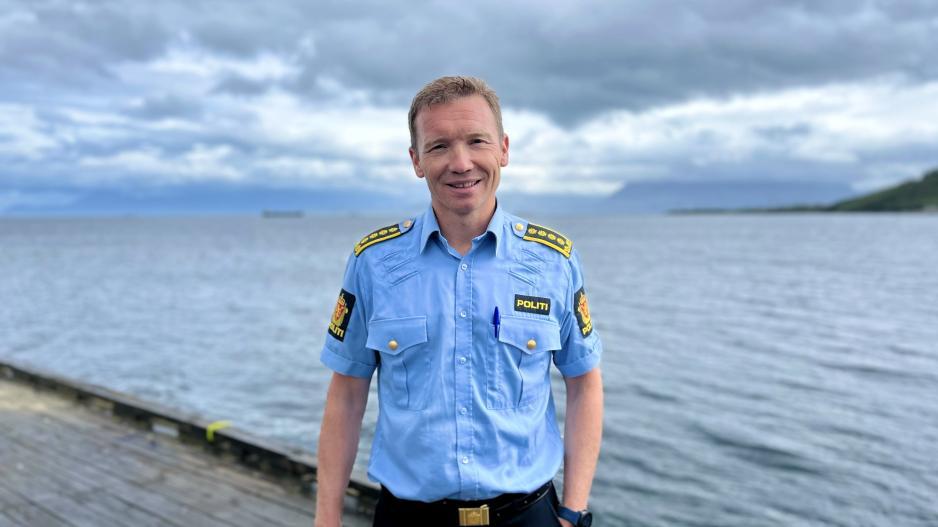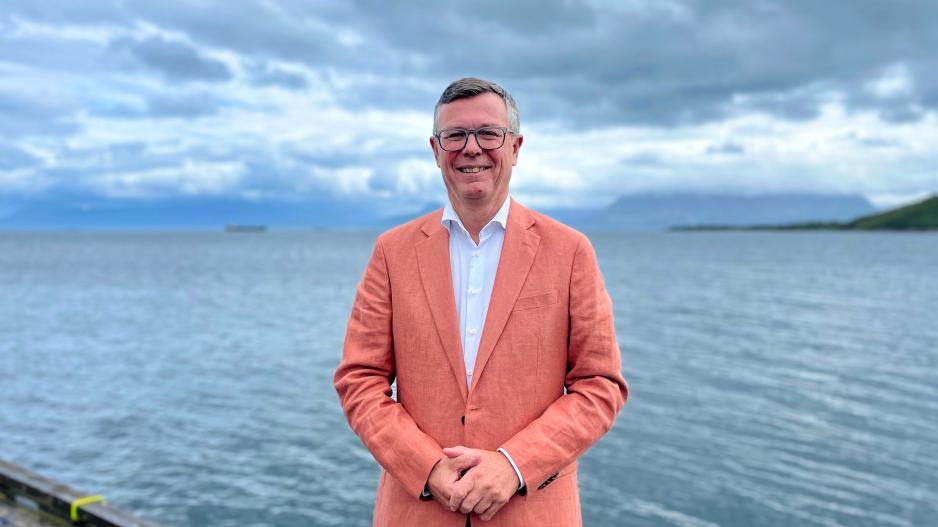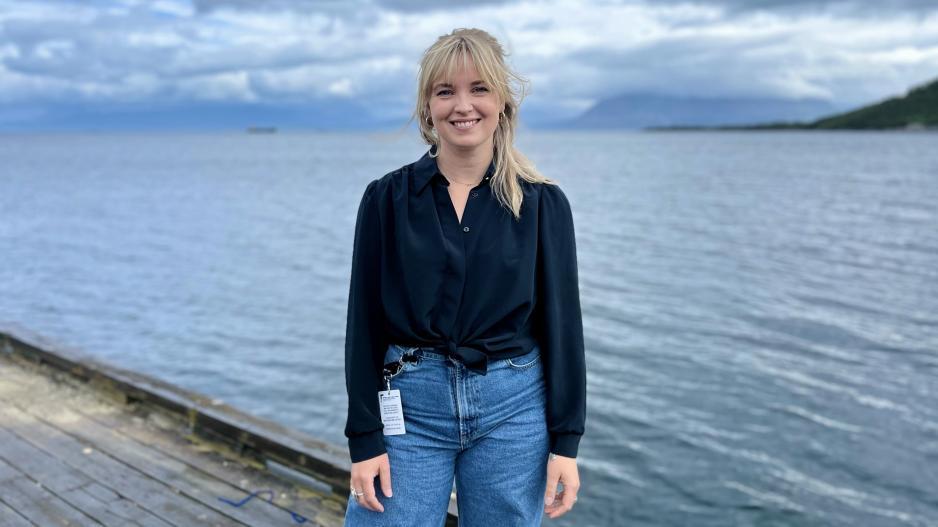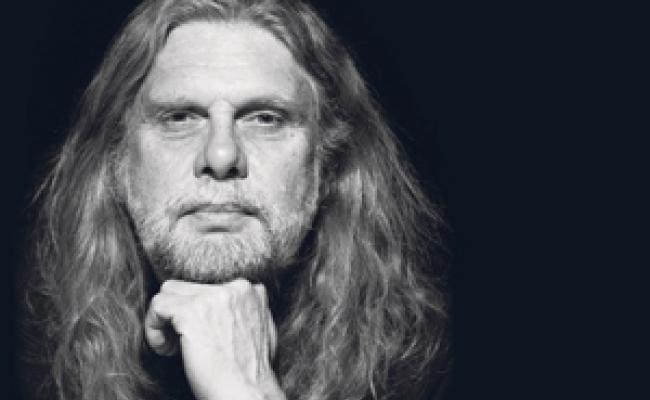High Noon: Rebekka Brox Liabø: Helps Northern Youths to Find Their Voice Through Writing
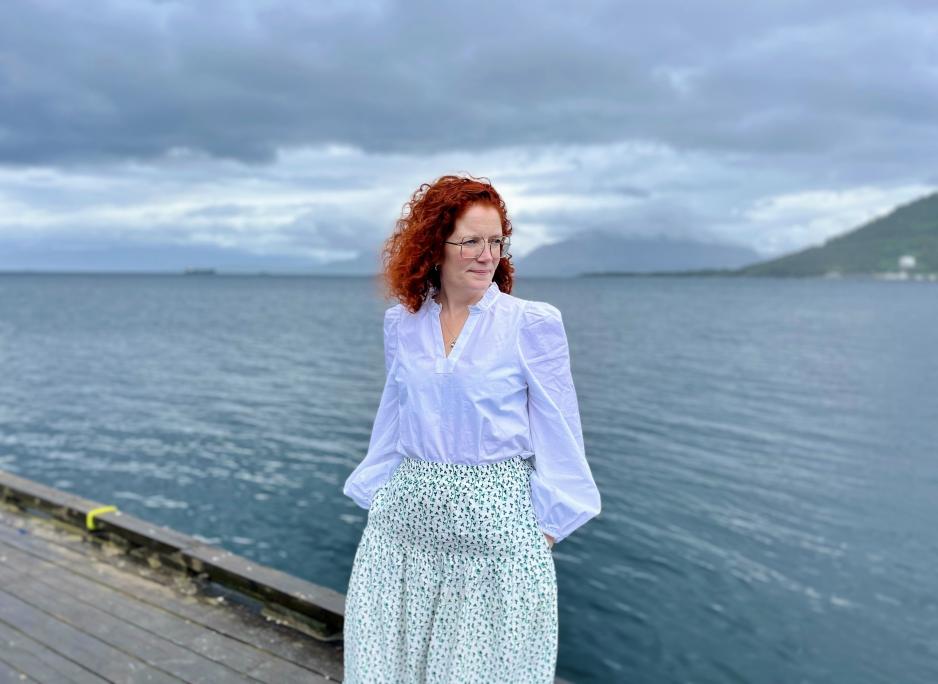
Primary guest at High Noon on Monday: Rebekka Brox Liabø, writing pedagogue, playwright, and author. (Photo: Astri Edvardsen)
Harstad (High North News): Creating a safe framework for youth to explore writing about their own experiences and opinions and sharing their own words with several listeners. That is how pedagogue and playwright Rebekka Brox Liabø works with developing language skills and belonging among the young in Northern Norway.
This week, the debate series High Noon has been organized in Harstad, Northern Norway, through a collaboration between the Arctic Arts Festival and High North News.
The topic of Monday’s debate was formative conditions in the North, focusing on outsiderness and youth culture violence.
An increasing number of young people across the North are leaving behind their northern roots and moving southward. In Sweden, violence and crime are accelerating. This is expanding, not least to Norway, and creates significant challenges for society. At the same time, local communities that do not fulfill young people’s dreams are depleted.
How will we face these challenges?
Primary guest: Rebekka Brox Liabø, writing pedagogue, playwright, and author.
Of current interest: The theater performance Lykkejegerne ('The Fortune Seekers') at the Arctic Arts Festival. It gathers youth from various countries to explore migration, community, and personal growth. Personal stories on the universal human search for happiness are presented through an Eritrean coffee ceremony.
Liabø has been awarded both an equality and cultural prize from Tromsø municipality for her innovative artistic work.
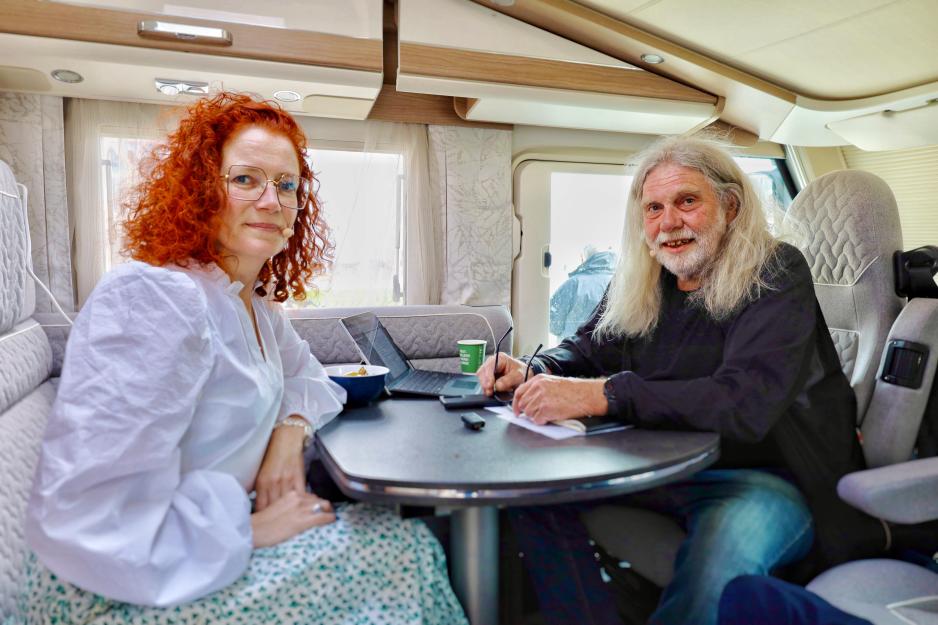
Rebekka Brox Liabø in conversation with High North News Editor Arne O. Holm, leading the debate series High Noon. (Photo: Astri Edvardsen)
Artistry for belonging
Liabø started the project Snakk for deg sjøl ('Speak for yourself') in 2010.
She employs methodology developed with researchers from UiT, the Arctic University of Norway, to motivate youth to develop their own voices – first in writing and then in speech.
Parts of the written material also result in scenic performances at various cultural institutions, such as Hålogaland Theater in Tromsø or the current Arctic Arts Festival in Harstad.
Liabø’s artistry can be said to provide youths with an inlet to write and speak themselves into a meaningful context. That they, with their own words and perspectives, take place in a community, instead of carrying a sense of outsiderness.
“The project came to life after working in schools where I experienced that there were pupils in every single class who did not express themselves in writing. I considered it a democratic problem that so many young people do not write and say what they think, believe, and feel about various subjects,” says Liabø.
Over the past fourteen years, she has tackled the issue across Northern Norway – working with several hundred youths every year.
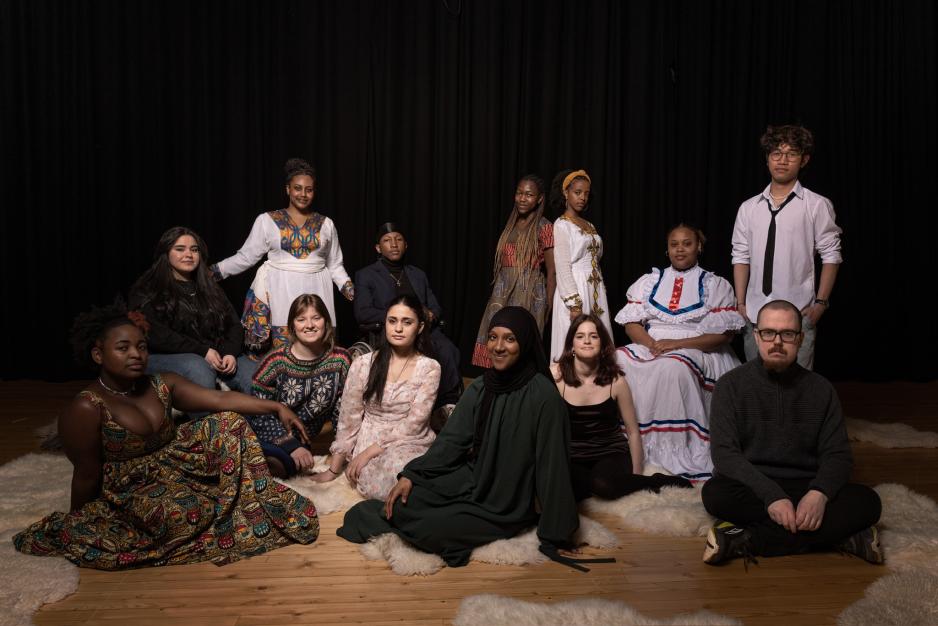
The theater performance Lykkejegerne ('The Fortune Seekers') came about through Rebekka Brox Liabø’s work with 13 youths who have come to Tromsø from all over the world. “All people are looking for happiness. That is how it has always been,” says performer Liomary Castro Aquino. (Photo: Knut Åserud/Snakk for deg sjøl)
Insight into the thoughts of young people
“Many of the youth I talk to do not consider themselves important and say they want to quit school. When I ask them why, the answer is often: “Uhm. No… Everything just sucks.” But when they start writing and talking more about it, the real issue emerges,” Liabø points out.
Dropping out of high school is among the topics Liabø and the youths explore at the writing workshops.
Tasked by the County Governors in Northern Norway, a central issue is often why the young people want to move from here, she says.
“A workshop question could also be: Why aren’t you sleeping?” she laughs.
In other words, the issues addressed are topical for both youths and curious adults.
Practice that goes somewhere
In addition to creative writing exercises, the workshops also include theater exercises.
This combination resonates with the young, observes Liabø.
“The theater exercises are taken from how actors prepare to get on stage. They focus on getting good at cooperating and telling stories; using their voices and eyes effectively.”
In total, the exercises result in the youth having written and read a text aloud in the classroom at the end of the day.
“There are youth among these that stopped writing in 5th grade and now have a self-written text. They are so surprised and pleased: ‘Wow, here’s my voice. Here I am,’” says Liabø.
“And although many find it all awkward at first, we mostly have good moments where we have fun together. But those I am apprehensive about and particularly concerned with including, are those who do not want to be there. Those who usually are not present for a whole day of school. Those who truly do not write at all. Those are the ones I really want to get hold of."
The most vulnerable
“An important point is that the youth we speak to regarding outsiderness and violence are very vulnerable people,” says Liabø, referencing the High Noon debate.
She believes we must carefully examine different degrees of gravity and vulnerability when we address issues related to the young.
“Of course, many youths struggle with exam stress, anxiety, and other mental challenges. But the young that truly fall behind and perhaps turn to violence are the young people who do not have a support system. Those who cannot walk into a youth club. That could never look at a concert poster and think: “Oh, I am going to a concert tonight!”. They do not participate in society in a way that is natural for many of us other people."
Requires patience
Youths who truly end up on the sidelines cannot just be brought back in swift action either, Liabø points out.
“When I tell people I work with preventing and repairing outsiderness, many respond with: ‘Oh, you’re so kind’ or ‘How nice.’ Yes, I say, but it is mostly about being patient in the beginning and putting up with people who say ugly things to you. Who calls you an idiot when they want to. Who do not show up at the agreed-upon time. Or who just doesn't come,” she says and continues:
“When you have fallen behind and are carrying traumatic experiences, for example, through bullying or many years in the child protection services, you won’t be that pleasant to deal with. It also takes a lot of time to build trust and connect with someone.”
“I don’t work with those who are worst off, but I am concerned with talking about how bad things are for them – that they must be supported the entire way in order to join new arenas.”
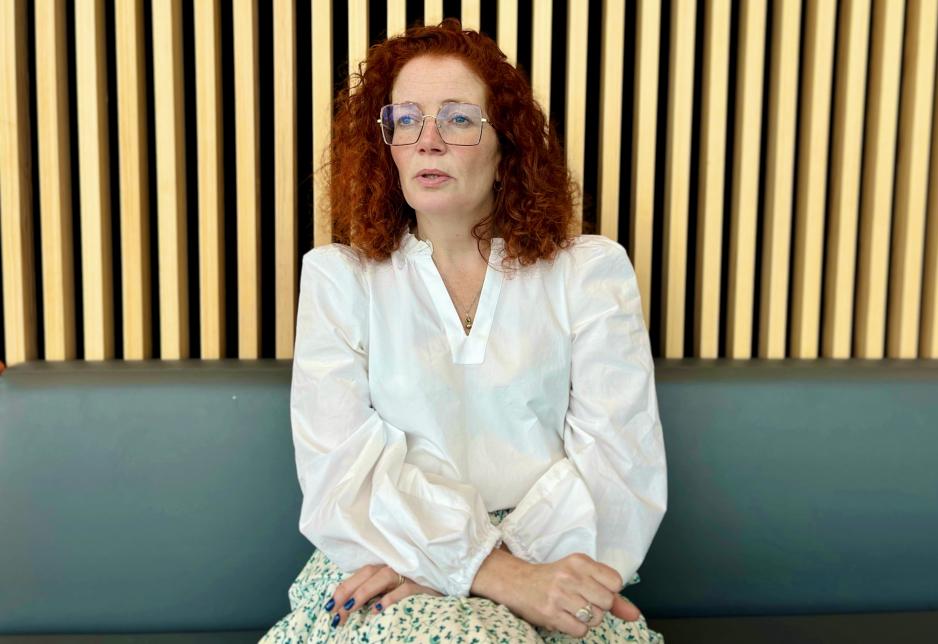
“The problems surrounding the young are major and complex. But the youths that go out with a knife in their pocket, planning to meet in a backyard to beat up someone in their class; those are not young people struggling with exam anxiety,” says Rebekka Brox Liabø. (Photo: Astri Edvardsen)
For further debate
What should we continue discussing regarding formative conditions in the North?
“We should continue discussing child protection services. It is very important to have a strong child protection service in Norway. However, some major challenges must be addressed so that the measures truly are for the best of children and young adults. I particularly think about all the moving many children and youths must go through. Many experience up to 20 moves until they are 18. It is obvious that this is not a good practice,” answers Liabø.
In addition, we should revitalize the discussion of bullying – and start a new one, she thinks.
“Today, it has almost become old-fashioned to talk about bullying. It is almost not a “buzzword” anymore. But bullying destroys young people. We must never forget that.”
“We should also dare to talk about parental support. In my experience, many parents are unsure how to tackle various problems. They need support to raise and be present for their children. I don’t know quite where such help should enter, but I feel this is something we need to figure out.”
In the face of the complex
We must also learn that the world is difficult, believes Liabø.
Violence and crime are spreading in society. Climate change and war threaten.
“I think we all, youths and adults, must be critical and look up: put away our phones and look each other in the eyes; talk about the challenges in society around us and dare to face them,” she says.
This learning process can also be supported and stimulated by the arts.
“Through art, such as theater performances and concerts, one has meeting places and shared experiences. In various interesting, fun, and strange ways, one can address and further develop the debate that goes on in society at large. We have the means of lightning, sound, and scenography to captivate and get the audience talking."
WATCH THE DEBATE HERE (IN NORWEGIAN):
The panel
These also participated in the debate:
- Luna Drecker, leader of the Tromsø Youth Council
- Martin Gamst Johansen, the previous leader of the Barents Regional Youth Council
- Yngve Myrvoll, intelligence, preparedness, and investigation leader in Troms police district
- Dag Rune Olsen, Rector at UiT – the Arctic University of Norway
Artist and songwriter Thea Glenton Raknes provided a musical input.
The debate series
High Noon also includes the following debates:
- Tuesday 25.06: Resilience in the North – are we prepared for what is in store? (in Norwegian)
- Wednesday 26.06: Nordic democracy under pressure? (in English)
- Thursday 27.06: Artists as moral compasses (in Norwegian)



